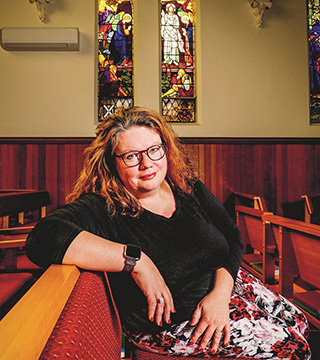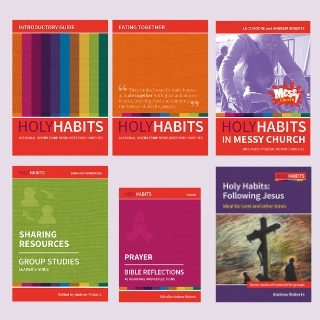BRF depends on people getting involved in our work by volunteering, by praying, by spreading the word, by giving through donations and legacies and by using our resources. In the latest of our series of articles about people who have got involved, Andrew Humphries hears from Uniting Church of Australia minister Sandy Brodine about her Holy Habits group in the Melbourne suburb of Banyule…
22 August 2021
Holy Habits – a favourite part of the week
It’s 11.00 am on a Friday in early June and a group of Banyule Network of Uniting Churches members are meeting online as part of a regular weekly gathering. It has become a favourite part of the week for them as they embrace a different type of worship and prayer. In fact, one group member says he feels a real loss if he is unable to attend ‘virtually’ each week for any reason.
Guiding group members is a form of discipleship known as Holy Habits, created and pioneered by UK Methodist Minister Andrew Roberts and available as a book and through a wide range of other resources published by BRF.
Holy Habits provides a fresh impetus for, and reimagining of, worship, based on Acts 2:42-47, in which Luke outlines a picture of what the church should represent. Based on Luke’s words, Holy Habits encourages the ten disciplines, or habits, of biblical teaching, fellowship, breaking bread, eating together, gladness and generosity, serving, worship, sharing resources, prayer, and making more disciples.
‘One group member feels a real loss if he is unable to attend.’
A dramatic and positive impact
Spend time online with Banyule’s Revd Sandy Brodine and members of the Holy Habits group and it quickly becomes obvious what a dramatic and positive impact it has had on them. As an example, Sandy offers the Holy Habit of fellowship, which played a crucial role as members dealt with a number of issues during 2020.
‘A few of us had some pretty awful stuff going on within our families and last year was pretty difficult,’ Sandy says. ‘One of the Holy Habits that we worked on quite a lot was offering fellowship, or hospitality, to each other in the way we support and listen to one another in our struggles.’

From one group to six
Sandy first heard of Holy Habits when she attended an international Messy Church conference in the UK in 2019 and was lucky enough to hear Andrew Roberts speak. She knew instinctively Holy Habits was something that could work well within the Banyule network, and there are now six separate groups, three of which run continuously. The beauty of Holy Habits, Sandy says, is that each group’s members can explore it in their own way.
‘The model is that we have different groups of people trying different things in different ways, rather than one size fits all,’ Sandy says. ‘The purpose is around helping the whole group, and everybody in the church really, to grow their own sense of discipleship by using the Holy Habits to actually deepen their own faith. It’s not really about, “Oh, let’s read this book and we will know more about stuff”; it’s an exercise in changing who you are on a much deeper kind of level.’
‘It’s not about reading a book… it’s an exercise in changing who you are on a much deeper level.’
A vision and a model
Banyule members’ experience around what Holy Habits offers reflects Andrew’s own vision of what it can offer to both new and existing faith communities.
‘For newly forming communities, Holy Habits offers a vision for and model of what that community could and should be,’ Andrew says. ‘For existing communities, it offers a helpful means of audit and the challenge to be renewed.’
So, how then, is Holy Habits best utilised by faith communities? The answer to that, says Andrew, revolves around the level of commitment each member is prepared to put into it.
‘I hesitate to use this word, as it is in danger of being conference-speak, but the answer is “intentionally”,’ he says. ‘Luke is a very deliberate writer and it is instructive that he begins the Acts passage 2:42-47 by saying, “They devoted themselves to…” Research has shown that when it comes to forming disciples and churches, the primary human determinant of growth and fruitfulness is devotion or commitment.’
‘When it comes to forming disciples, the primary determinant of growth is devotion.’
Lives changed
Wherever Holy Habits has been taken up and explored, there have been delightful – sometimes surprising – stories of lives changed and communities coming together. In Banyule, too, when it comes to changing lives, Sandy knows exactly what a difference an act inspired by one of the Holy Habits can make. In this case, it’s the Holy Habit of sharing resources in the community.
‘One particular member of one of our Holy Habits groups has had a lot to do with prison fellowship through her family for many years,’ Sandy says. ‘They were part of a project called Angel Tree at Christmas which provides presents for the children of prisoners. Angel Tree buys gifts for the children and prisoners write the cards, but obviously that was a bit more tricky to do than usual last year. So, a number of people got together and we got donations from across the network and bought the gifts, and there was a real sense of different Holy Habits groups coming together as part of that project. We’re trying to make people aware that when we do that it’s a faith response and a response to who God calls us to be.’
The original article appeared in Crosslight, a bi-monthly magazine produced by the Communications and Media Services unit of the Uniting Church in Australia Synod of Victoria and Tasmania.
This is an edited extract from an article by Andrew Humphries, communications officer for the Synod of Victoria and Tasmania in the Uniting Church in Australia, and published here with permission.

Holy Habits is a way of life for those exploring or already actively living out the call of Jesus to ‘follow me’. It is based on Luke’s portrait of the community of followers of Jesus, as described in Acts 2:42–47.

The Holy Habits church handbooks, Group studies and Bible reflections are designed to help churches explore the habits creatively in a range of contexts and live them out in whole-life, intergenerational, missional discipleship.
Read more about people who got involved in Holy Habits
